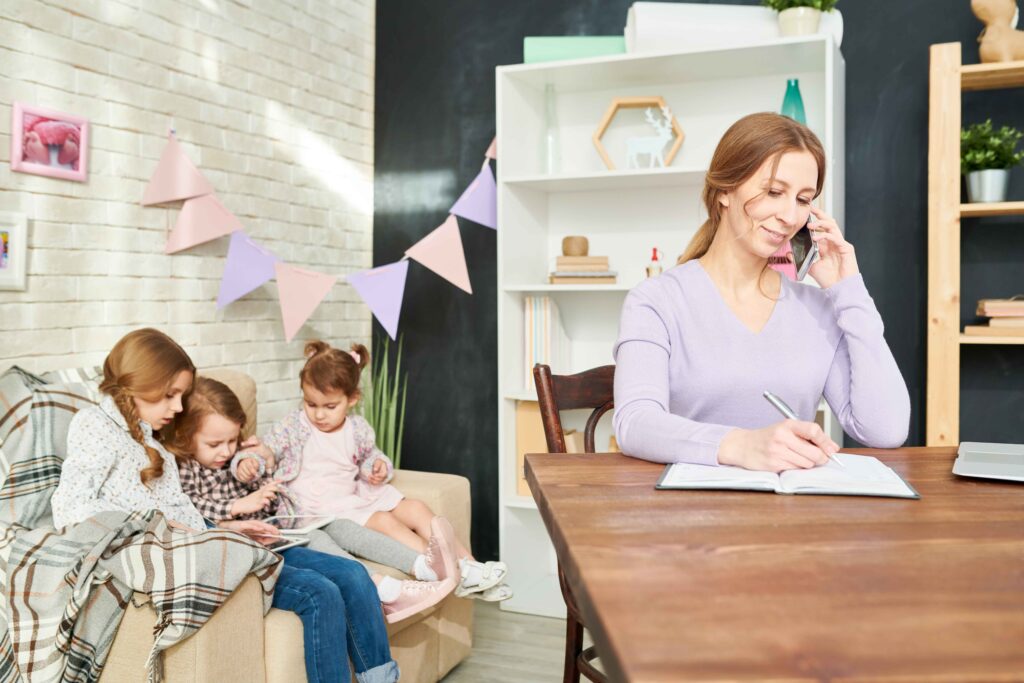Default Parent
Have you ever felt like you’re the only one who knows where everything is? You are the one who remembers the dentist appointment. You are the one who makes sure the right snack is packed. You are the first person your family turns to for every kid-related task and every home chore. This is what many people call being the “default parent.” It is a role filled with love, but over time, it can also become very heavy. Those small, everyday responsibilities begin to pile up, and they can leave you carrying more than your share.
If this sounds familiar, know that you are not alone. Learning about this is one of the first steps toward easing the load. You deserve rest. You deserve support. You deserve care.
So let’s take a look together at what this all means. Let’s also look at some tips for balancing parenting roles at home, so that you feel a little lighter in your days.
The Toll: Exhaustion, Stress, and Resentment
So, what does it mean to be the default parent? You or your partner may be the default parent if one of you is the first to handle school notes, meal planning, playdates, and doctor visits.
As a default parent, you might feel like your brain is always on “reminder mode,” constantly scanning and worrying. That can show up as persistent anxiety, disrupted sleep, or feeling tired even after rest. You may snap at your partner or kids without meaning to, just because you’re carrying an invisible mental load.
And that’s not all. Emotionally, default parents can feel resentment or guilt. You might feel resentful because your partner seems “off-duty” while you do the day-to-day legwork, even if they’re trying to help. Or you feel guilty even asking for help, thinking it’s your job.
Psychologist Dr. Amber Thornton calls it Default Parent Syndrome: default parents often feel burned out, under-appreciated, and less able to take care of themselves. And it’s not just moms. Any primary caregiver can feel this way, but women report the emotional and mental load of the default parent far more. In fact, research confirms women spend about five times more time on unpaid domestic and care work than men.
This imbalance can strain relationships. The default parent often ends up exhausted and a little bitter. It’s not because they don’t love their family, but because they’re human and can’t keep going at full tilt alone.
Why It Happens
Why does one parent often become the default? A mix of habits, routines, and expectations plays a part. In many families, one parent may take more parental leave or have a more flexible schedule. That parent naturally becomes the go-to.
Over time, small patterns set in. Schools might call the same parent first. Kids may ask one parent before the other. Friends and relatives might assume one person is in charge. These repeated moments build into a lasting role.
Beneath these habits are deeper social expectations. Many cultures still see mothers as the primary caregivers, even when both parents work.
These ideas can shape choices without anyone noticing. Slowly, the default parent role takes hold, and it can feel hard to shift the balance of parenting roles and responsibilities.

How to Share Parenting Responsibilities Equally
If this feels familiar, take heart: it can change. Millions of parents feel the weight of the default-parent role. Talking openly, dividing tasks fairly, and using tools and shared parenting strategies can lighten the load for everyone.
Check out these strategies on how to share parenting responsibilities equally:
- Talk it out (without blame). Start by explaining how overwhelmed you feel and ask your partner to listen. For example: “I’ve been feeling really stretched thin managing our home. I wonder if we could divide our parenting roles and responsibilities more evenly.” Framing it as a team issue invites collaboration, not criticism.
- Assign full ownership. Instead of asking your partner to “help with school stuff,” try assigning them a whole category to own. For example: “You’ll do all doctor appointments from now on. This way, they really take charge, rather than you delegating bits that you still manage.
- Use shared tools and systems. Rely less on your memory. Keep a shared family calendar or to-do list so everyone can add and check tasks. AI-powered helpers like familymind make it even simpler. They make the invisible visible. They automate and distribute tasks, easing that mental juggling act, and also offer tips for balancing parenting roles at home.
- Encourage independence. Resist the urge to be your family’s search engine. If your partner or child asks where something is, try asking them to find it first. Train kids to look in the usual drawer or ask Dad about soccer practice. It’s okay if they ask a million questions at first. Over time, they’ll learn where things are without you.
- Accept imperfections. Your way isn’t the only right way. When your partner takes on a task, let them own it…even if it’s different from how you’d do it. They’ll likely surprise you by learning and improving over time.
- Take breaks (really!). Plan some time for yourself and actually step away. Don’t leave a detailed itinerary when you go to a coffee date or the gym. Trust that your partner will handle things.
Coming up with shared parenting strategies doesn’t mean you won’t care about your family. It means caring enough about yourself and your partner’s growth.
Final Words: Getting Support
As a default parent, some tasks or stress still feel too big to split just between partners. That’s okay. Many parents find extra help valuable.
This can mean hiring a babysitter or nanny for a few hours, joining a parent support group, or talking with a therapist about stress and coping mechanisms, and shared parenting strategies. Remember: asking for help is a sign of strength, not weakness.
Helpful Tools for Digital Native Parents
In our age, there are also helpful tools built for exactly this situation. Familymind is an AI family assistant designed to lighten the mental load. It automatically distributes chores and reminders across the family, doing some of the memory work for you.
You can also get on-the-go tips for balancing parenting roles at home through the smart AI assistants in the app. Think of it as adding a reliable family coordinator, so details don’t all stay in one person’s head.

You Deserve a Break
One tip from child expert Dr. Becky Kennedy is to manage the guilt that comes when you start sharing. Remind yourself that it’s okay for routines as well as parenting roles and responsibilities to shift.
Every parent deserves a break now and then. It’s okay to say, “I need help.” Your family will thank you, and you’ll be setting an example that everyone’s needs and contributions matter.
After all, raising kids while living your own life is a team effort that needs shared parenting strategies. And when the team works together, life at home can feel a lot kinder and happier for everyone!
FAQs
What does it mean to be the “default parent”?
You step into the role of keeping track of schedules, daily tasks, and family needs. You do the work and hold the planning in your mind, often before anyone else notices what is needed.
How can parents share the mental and emotional load more equally?
Talk openly about invisible work. Divide tasks with care so each person carries both the planning and the doing. Keep checking in with each other to adjust as life changes.
What are the hidden costs of being the default parent on mental health?
Carrying the load alone can drain your energy, bring constant stress, and create feelings of anxiety or irritability. Over time, it can leave you feeling burned out and disconnected from yourself.



